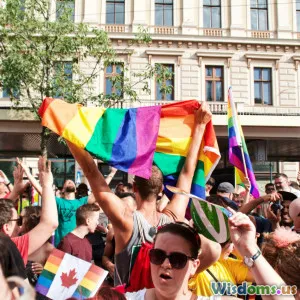
How Family Acceptance Impacts LGBTQ Plus Relationships Explained
7 min read Explore how family acceptance profoundly shapes LGBTQ+ relationship health, resilience, and happiness. (0 Reviews)
How Family Acceptance Impacts LGBTQ+ Relationships Explained
Introduction
In recent years, the visibility and recognition of LGBTQ+ identities have grown significantly, sparking important conversations about acceptance and support. Yet, while society at large grapples with inclusivity, one arena remains critical—the family. Family acceptance can serve as either a powerful foundation or a formidable barrier in the lives of LGBTQ+ individuals, especially concerning their relationships. This article explores in depth how family acceptance influences LGBTQ+ relationships, from emotional well-being to long-term connection stability. Why does it matter so profoundly? And how can families transform their support to foster thriving LGBTQ+ partnerships?
Understanding Family Acceptance
Before delving into its impact, it’s essential to clarify what we mean by family acceptance. It is not merely tolerating or ignoring an LGBTQ+ relative’s identity but actively embracing and supporting it. This can manifest as verbal affirmation, inclusive behaviors, defending them against discrimination, or participating in LGBTQ+ events. According to the Human Rights Campaign's Family Equality Council, this acceptance creates a protective lens through which LGBTQ+ individuals and their relationships flourish.
Example: A 2019 CDC study showed LGBTQ+ youth with higher family acceptance reported significantly better mental health outcomes, which directly correlates with healthier interactions and relationships.
The Emotional Impact: Building Resilience and Confidence
One of the most immediate effects of family acceptance on LGBTQ+ relationships is emotional reinforcement. When individuals experience positive reinforcement from their families, it fosters:
- Higher self-esteem: Affirmation from loved ones enhances confidence in both personal identity and relationship choices.
- Reduced stress: Acceptance alleviates fears of rejection or concealment, which often burden LGBTQ+ individuals.
- Enhanced communication: Healthy family dynamics model effective communication that partners can emulate.
Conversely, family rejection can fuel minority stress—a chronic social stress from prejudice—resulting in increased anxiety and depression which strain romantic partnerships.
Case Insight: For example, consider Jamie, a transgender woman who found unwavering support from her parents during her transition. This acceptance helped her approach her romantic relationship from a standpoint of honesty and strength, leading to greater intimacy and mutual understanding with her partner.
Social Support and Its Influence on Relationship Stability
Beyond the emotional realm, family acceptance often dictates the degree of social support available. In cultures where family bonds are strong, their endorsement of LGBTQ+ relationships often translates into:
- Community integration: Positive family ties allow LGBTQ+ couples to partake more fully in communal and family events, reinforcing the relationship's social legitimacy.
- Economic support: Families sometimes contribute financially or provide housing assistance, reducing stressors that couple relationships must otherwise manage alone.
Consider research published in the "Journal of Marriage and Family" which found that LGBTQ+ couples with family acceptance were more likely to stay together, attributing this to both emotional and material support.
Breaking Down Myths: Family Acceptance Doesn't Necessarily Come Easy
Despite the clear benefits, some families struggle with acceptance due to cultural, religious, or personal beliefs. It’s vital to approach these situations with empathy and education rather than judgment.
- Families hesitant or resistant may fear societal stigma or feel unprepared to understand LGBTQ+ identities.
- Counseling and family therapy focused on LGBTQ+ awareness can bridge gaps.
An excellent illustration is the "Family Acceptance Project," whose findings encourage tailored interventions for families to transition from rejection to acceptance.
Long-Term Relationship Outcomes: Beyond Childhood
Does family acceptance affect LGBTQ+ relationships into adulthood? Absolutely. The foundation laid early influences how LGBTQ+ individuals navigate later relationship milestones:
- Commitment: Supported individuals feel safer committing openly.
- Conflict resolution: Healthy family models promote better handling of disagreements.
- Parenting: LGBTQ+ parents with family acceptance report higher well-being, positively influencing their co-parenting experiences and children's outcomes.
Studies show that LGBTQ+ adults describing family acceptance also report lower incidences of substance abuse and intimate partner violence, critical markers of relationship health.
Actionable Insights: How Can Families Foster Acceptance?
Encouraging family acceptance is a social imperative with tangible benefits. Here are practical steps families can take:
- Educate themselves: Understanding LGBTQ+ experiences reduces misinformation.
- Engage openly: Listening without judgment and asking respectful questions creates trust.
- Affirm identity consistently: Small acts like using chosen names/pronouns signal deep respect.
- Connect with supportive networks: Family support groups provide resources and shared experiences.
Even incremental progress plants seeds for healthier relationships and emotional wellness.
Conclusion
Family acceptance is far more than a sentimental ideal—it's a critical determinant of health and happiness for LGBTQ+ individuals and their relationships. From emotional resilience and social support to long-term stability, the family's role shapes the lived experiences of LGBTQ+ people uniquely and powerfully. As society progresses, understanding and championing family acceptance should be at the forefront of efforts to build inclusive, supportive communities.
By fostering acceptance, families not only uplift their LGBTQ+ members but also enrich society as a whole with stronger, healthier relationships founded on love and respect.
References:
- CDC, 2019 Youth Risk Behavior Survey
- Human Rights Campaign, Family Equality Council
- Journal of Marriage and Family, various studies on LGBTQ+ family acceptance
- Family Acceptance Project
Rate the Post
User Reviews
Popular Posts




















